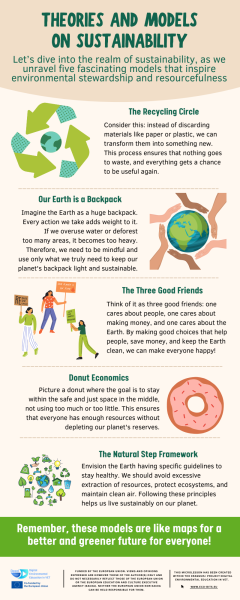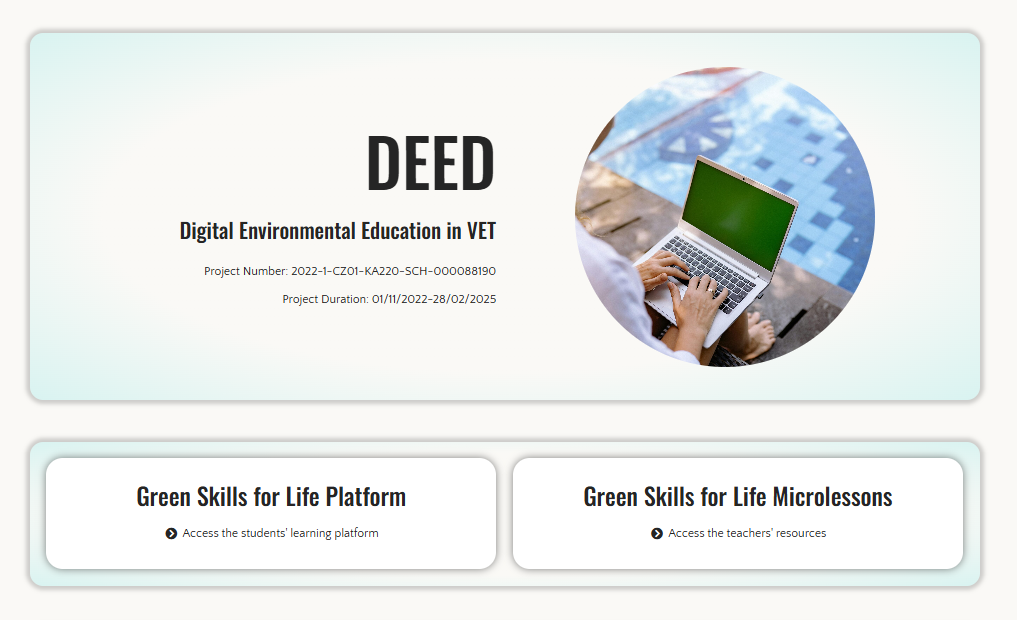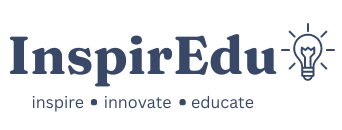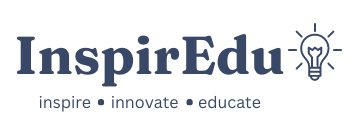Microlearning for Sustainability: How Modular Lessons Can Empower Adult Learners

Author: Lucie Brzáková
Published: 14/05/2025
Discover how microlearning and modular green lessons from the DEED project can empower adult learners to take action for a sustainable future.
In recent years, adult educators have faced two growing pressures: the need to help learners build real-world sustainability competences, and the challenge of doing so in increasingly time-pressured, diverse, and digital learning environments. The DEED project (Digital Environmental Education for VET Learners) set out to tackle both — and discovered that one of the most powerful tools in our hands is surprisingly simple: microlearning.
What started as a digital education project for vocational learners quickly became something much broader. Along the way, we realised that the modular, flexible learning model we created is perfectly suited to adult education — especially when it comes to teaching about the green transition.

Why microlearning?
Adult learners often juggle multiple responsibilities — jobs, families, caregiving, reskilling. Sitting through long lectures or dense curricula isn’t always an option. Microlearning offers an alternative: short, focused learning experiences that are easy to fit into everyday life.
It’s not just about convenience. Microlearning helps learners:
– Retain knowledge better, thanks to smaller cognitive load
– Feel progress quickly, boosting motivation
– Choose their own learning path, which increases ownership and engagement
But for microlearning to work in adult education, especially for topics as big as sustainability, it needs more than just small size. It needs clarity, credibility, and connection to real-world skills.
The DEED experience: Building microlearning for green competences
The DEED project developed a training program of 215 microlessons covering core green competences, aligned with the European Green Deal and the GreenComp framework. While our initial focus was on vocational learners, the format — and feedback — revealed something powerful: this model works equally well for adult learning.
Each microlesson is:
– Focused on a single key message (e.g. “The greenhouse effect is essential for life”)
– Designed to be completed in 3-5 minutes
– Available in 8 languages, making it accessible across Europe
– Delivered as an infographic, comic, or short video, often with an interactive quiz or task
– Paired with a downloadable lesson plan, making it easy for trainers to integrate
We also developed a microcertification platform, where learners can earn digital badges by completing lesson sets and passing short quizzes — a great motivator for adult learners looking to document their growth.

What we learned about adult learners and sustainability
Through testing and feedback, especially during our multiplier events and piloting phase, we saw that adult learners respond especially well when:
– The content is practical and emotionally relevant (e.g. food waste, energy choices, consumer habits)
– The content is practical and emotionally relevant (e.g. food waste, energy choices, consumer habits)
– The educational message avoids guilt or overload, and instead focuses on what can be done now
Interestingly, many adult learners reported that the microlessons helped them connect their everyday actions to broader environmental systems — something traditional instruction often fails to do.
Why this matters for adult education
Sustainability is no longer just a specialist topic — it’s something every citizen needs to understand. But for adult learners, especially those outside formal education systems, entry points need to be clear, short, and empowering.
That’s where modular microlearning offers a real opportunity. It allows educators to:
– Pick and choose relevant topics (e.g. “Plastic Waste” or “Circular Economy”) based on learners’ interests or community needs
– Pick and choose relevant topics (e.g. “Plastic Waste” or “Circular Economy”) based on learners’ interests or community needs
– Pick and choose relevant topics (e.g. “Plastic Waste” or “Circular Economy”) based on learners’ interests or community needs
And because the DEED resources are open access, they can be used, adapted, and translated without restrictions.

Where to start
All microlessons and teaching tools are freely available at the DEED Training Forum: https://www.eco-bits.eu/deed No registration needed — just browse by topic or competence area, and download what you need.
You can also:
– Access editable Canva templates
– Access editable Canva templates
– Use the microcertification platform to issue badges to learners
– Explore the Virtual Library with 350+ additional green education resources
Looking ahead: Our message to adult educators
Whether you work in a formal training institution, a grassroots initiative, or a community project, you don’t need to create everything from scratch to teach sustainability. The tools are here — short, modular, multilingual, and field-tested.
Microlearning isn’t just a method. It’s a mindset: helping learners take one step at a time toward a more sustainable future.
We believe this approach can transform how adult learning meets the climate challenge — one small, powerful lesson at a time.


Add a Comment